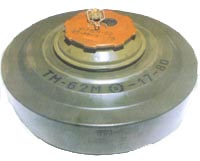This article includes a list of references, related reading, or external links, but its sources remain unclear because it lacks inline citations. (December 2014) |
The TM-62 is a Soviet anti-tank blast mine made in many variants. It has a central fuze and typically a 7.5 kilograms (17 lb) explosive charge, but the variants differ greatly in detail. The mine can be laid manually or automatically from a mine laying machine including the PMR-1, PMR-2 wheeled towed mine layers, the GMZ-3 tracked mine laying vehicle and the VMR-2 helicopter mine laying system. The TM-62 can be fitted with the same fuzes as the TM-72, which include MVN-72 and MVN-80 fuzes, which are vibration and magnetism sensitive. The mine was used in the 2022 Russian invasion of Ukraine.[1]
| TM-62 mine | |
|---|---|
 | |
| Type | Anti-tank blast mine |
| Place of origin | Soviet Union |
| Service history | |
| Used by | See Users |
| Wars | South African Border War Angolan Civil War Mozambican Civil War Second Sudanese Civil War Russo-Ukrainian War |
| Production history | |
| Variants | See Variants |

Variants
edit- TM-62M, with a circular metal case. It is the most widely employed variant.
- TM-62B, with a paper or cardboard case – basically a block of cast explosive with a fuze set into the center.
- TM-62D, with a wooden case.
- TM-62P, TM-62P2 and TM-62P3, with plastic cases. The TM-62P and TM-62P2 mine cases have ribbed sides, whereas the TM-62P3 has a smooth casing.
- TM-62T, with a fabric and epoxy casing and a central fuze.
Fuzes
edit- MVZ-62
- MVCh-62, the standard fuze with a clockwork arming delay of 30 to 120 seconds.
- MVN-62
- MVN-72, with a combination of electronics and clockwork, after an initial arming delay the magnetic influence fuze is enabled, powered by a 1.5 V battery.
- MVN-80, an improved version of the MVN-72.
- VM-62Z
- MVP-62, with a pneumatic bellows arming delay of 20 to 300 seconds. The delay mechanism uses a minimum of metal making it difficult to detect when used with one of the minimum metal cases.
- MVP-62M
- ZN-97, a magnetic influence fuze made in Poland.
Magnetic influence fuzes provide full-width attack, i.e. any part of the target vehicle passing over the mine will trigger detonation, not just the track or wheels. However, since magnetic fuzes are electronic, their operational life relies on battery power. Ultimately the battery will run down, after which the mine no longer functions. In contrast, a purely mechanical fuze (usually triggered via a Belleville spring) gives a much longer operational life (e.g., mines planted 50 years previously will still detonate if a target vehicle drives over them).
Specifications (TM-62M with MVZ-62 fuze)
editUsers
edit
See also
editReferences
edit- ^ Мельникова, Виктория (2024-08-02). "ВС РФ применили переделанные мины ТМ-62 для подрыва «опорников» противника". AiF (in Russian). Retrieved 2024-08-03.
- Jane's Mines and Mine Clearance 2005–2006